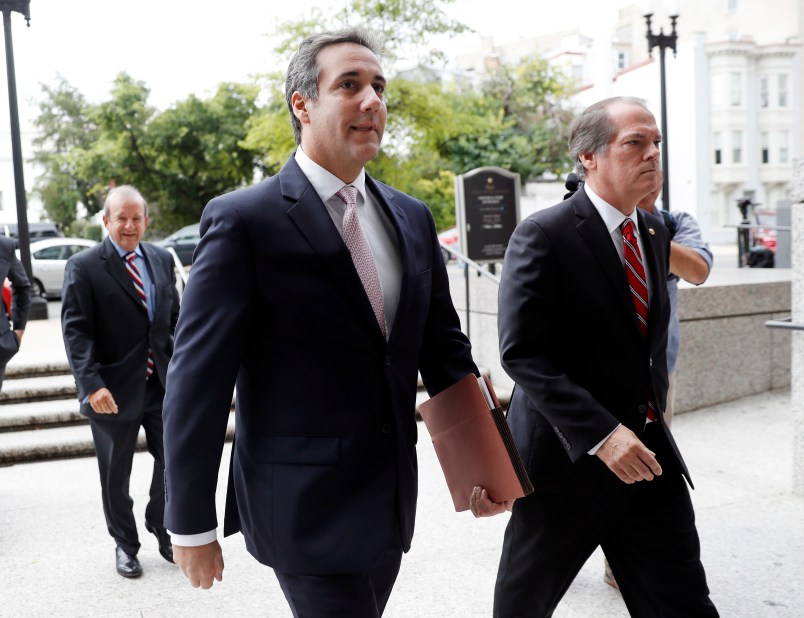The bank that Trump lawyer Michael Cohen used to pay $130,000 in hush money to adult film actress Stephanie Clifford — known as Stormy Daniels in the industry — flagged the payment as suspicious, the Wall Street Journal reported Monday.
An LLC that Cohen established used First Republic Bank to pay Clifford in order to keep an alleged sexual encounter between her and Trump under wraps; First Republic later reported the payment to the Treasury Department, one unnamed person with knowledge of the matter told the Journal.
The Journal said it was unclear when First Republic first reported the payment. Cohen previously told the paper, while declining to say why he used his own money to “facilitate a payment” to Clifford, that “just because something isn’t true doesn’t mean that it can’t cause you harm or damage. I will always protect Mr. Trump.”
Days before the 2016 election, Clifford’s lawyer threatened to cancel her nondisclosure agreement with Cohen because Clifford hadn’t yet received the promised money, the Washington Post reported Friday. Ten days later, the Post reported, the money arrived. The timing, according the paper, could support two groups’ complaints that the payment was essentially undocumented election spending.
In January, the campaign finance group Common Cause said Cohen’s payment to Clifford violated election law because the hush money “was an unreported in-kind contribution to Donald J. Trump for President, Inc.” The advocacy group filed a complaint with the Federal Elections Commission, as did American Bridge 21st Century Foundation, a Democratic Party-aligned advocacy group.
Mr. Cohen had missed two payment deadlines earlier in October “because he couldn’t reach Mr. Trump in the hectic final days of the presidential campaign,” the Journal reported, citing another unnamed person familiar with the matter. Anonymous sources told the Journal that, following the election, Cohen complained to friends that Trump hadn’t reimbursed him for the expense.
Cohen replied to the Journal’s request for comment with two words: “Fake News.”
Clifford acknowledged a 2006 sexual encounter with Trump in a 2011 interview with In Touch magazine.
Clifford and her attorney were using a client-trust account with City National Bank, which received Cohen’s payment on Oct. 27 2016, the Journal reported. The bank asked Clifford’s attorney in September of 2017 about the source of the payment, the Post reported. The Journal noted that the gap between the payment and City National’s internal investigation of it, nearly one year, was unusual.







If President Obama or anyone in his administration or associated with him did one one thousandth of what Trump and the Trumpsters have done the Repubs and the RWNJ’s would be going ape shit! Revolting that they are enabling this travesty!
I mean, it’s like one day you’re totally legally paying off a porn star to keep quiet about her affair with your boss who’s a presidential candidate and then all of a sudden…
your bank just unfairly turns on you.
Cohen has always been more on the “fixer” side of the lawyer/fixer continuum. And I do mean more on.
Fat Nixon is even too fucking stoopid to understand that there are certain line items on the accounts payable ledger that you simply don’t skip.
Stiffing your attorney for the hush money he paid on your behalf would be one example.
The headline isn’t that the bank reported the transaction. Banking regulations require the bank to report any large payment to Treasury. The headline is Michael Cohen made a large unreported payment to Daniels in violation of election law. Given that he reportedly missed two payments because he couldn’t connect with Trump in the midst of the election, the real question is, given the composition of the US Supreme Court, will either the lawyer or Trump ultimately be held responsible for paying the hush money.